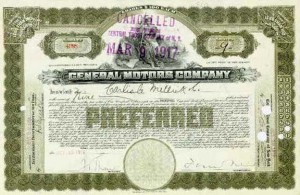
Taxpayers still stand to lose as much as $9 billion on GM's bailout - unless subsequent offerings rise to nearly $53 per share.
U.S. taxpayers have gotten a nearly $12 billion check from General Motors, the proceeds from the sale of 40% of the government’s holdings in the automaker during GM’s IPO, last week.
The maker’s return to public trading proved an unanticipated success, with GM and its underwriters both raising the price of the initial offering – to $33 a share from an earlier projected low of $26 – and adding significantly more shares to the pot than first planned. After deducting underwriter fees, the Treasury will keep $11.7 billion.
Nonetheless, taxpayers would stand to lose as much as $9 billion on the $49.5 billion GM bailout unless the price tag on later sales of Treasury-held stock is increased to at least $52.80 a share, analysts reported.
The government now estimates its potential loss on last year’s $85 billion in auto bailouts – which also include Chrysler and the captive finance company now known as Ally – at $17 billion. Earlier this year, the likely loss was forecast to reach as much as $30 billion.
Nonetheless, government officials defended the bailouts, which began under former President George W. Bush but were then significantly expanded when his successor, Barack Obama, moved into the White House.
“Our temporary assistance for the U.S. auto industry saved more than 1 million jobs across the industrial heartland of America and, like the overall TARP program, is on track to cost far less than anyone had first anticipated,” said Tim Massad, the Treasury’s acting assistant secretary for financial stability.
Otherwise known as the Troubled Asset Relief Program, the $700 billion TARP fund was created by Congress, in 2008, as an emergency measure meant to save the fast-crumbling U.S. financial industry. It was eventually tapped for Detroit, as well, when Congress declined former Pres. Bush’s request for a separate automotive bailout fund.
So far, $252 billion of the TARP funds have been repaid, in some cases at a profit for the Treasury.
Since returning to public trading, last week, General Motors has seen its shares rise as high as $35.99 during intra-day trading. Along with the rest of the market, it has slipped, in recent days, reflecting issues as diverse as the Irish economic crisis and the threat of war in Korea. But it has remained above the IPO price, a significant milestone. The stock closed at $33.25 on Tuesday but quickly jumped today, posting a fast 1% increase in mid-morning trading.
Standard and Poor’s meanwhile, yesterday forecast the stock will rise to $36 over the next 12 months, reflecting a likely jump in earnings from an estimated $2.78 per share in 2010 to $3.62 in 2011, the ratings agency predicted. (Click Here for more.)
Since GM has also paid back in full the loan portion of the bailout, the government has now recouped $21.2 billion from the automaker.
Taxpayers could yet receive another $1.8 billion and further draw down its holdings to around 28% of the GM total. As part of the IPO, underwriters have the right to sell off another 53.8 million shares at $33 apiece.

It’s pretty simple. If we want our money back then buy GM products. If not then keep buying that foreign junk. It’s up to us if we get our money back or not.
Not an entirely unfair point. The stronger-than-expected IPO reflects GM’s resurgence in the market as much as its cost-cutting. But it’s still got a long way to go. Personally, I don’t think folks should “Buy American” just because. That was an excuse Detroit long used to try to get away with selling inferior products. But today, many folks don’t consider the surprisingly good products that GM and the domestics, as a group, are introducing into their line-ups. Too bad. Politics is a strange part of the human condition. We selectively denounce “government motors,” but then support the competition that, in many cases, has had strong support from governments in Europe or Asia.
Paul A. Eisenstein
Publisher, TheDetroitBureau.com